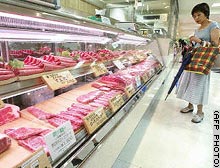U.S., Japanese officials renew talks over U.S. beef
Japanese and U.S. officials on Wednesday wrapped up the first day of talks on a survey of the U.S. meatpacking industry, as Washington seeks a reopening of the Japanese market to U.S. beef imports. Chuck Lambert, U.S. undersecretary for marketing and regulatory programs, and a team of agriculture officials met with officials from Japan 's Foreign, Health and Agriculture ministries at the Foreign Ministry.

They will meet for a second day of talks on Thursday, an official at the Agricultural Ministry said on condition of anonymity, citing protocol. He said he could not elaborate on the content of Wednesday's talks. Japan banned the meat in January over mad cow disease worries, and the U.S. officials are in Tokyo hoping to restart talks on lifting the ban.
However, Agriculture Minister Shoichi Nakagawa said Tuesday that Japan wants to review the survey results first and get answers to its questions about the 37 meatpacking plants authorized to ship to Japan before starting talks on reopening its market.
"We anticipate replies to our unanswered questions about the reliability of the (inspection) system the U.S. and Japan agreed upon," said Assistant Vice Foreign Minister for Economic Affairs Michitaka Nakatomi as the meeting began. "I'm here to answer any additional questions about our findings and determine when and how trade will resume," Lambert said in reply.
Meanwhile, responding to media reports that Tokyo would resume imports before Prime Minister Junichiro Koizumi's planned U.S. visit in June, a government spokesman said that politics should not govern the decision. "The main premise is to assure public safety and security. The issue should not be influenced by any political agenda," Deputy Chief Cabinet Secretary Jinen Nagase told reporters.
Japan initially shut its profitable market for U.S. beef in December 2003 after the first discovery of mad cow disease in the United States . The ban was eased in December 2005 to allow the import of meat from cows 20 months old or younger. But in January, Japanese customs officials found spine bones which Tokyo considers at risk for the disease in a shipment of American veal, and the market was closed again.
Since then, the U.S. conducted an investigation into the faulty shipment and submitted a report to Japanese authorities. Tokyo , however, had additional questions that it wants answered before reopening the market. Japan was once the most lucrative overseas market for U.S. beef, buying some US$1.4 billion (1.09 billion) of the meat in 2003, reports the AP.
N.U.
Subscribe to Pravda.Ru Telegram channel, Facebook, RSS!


